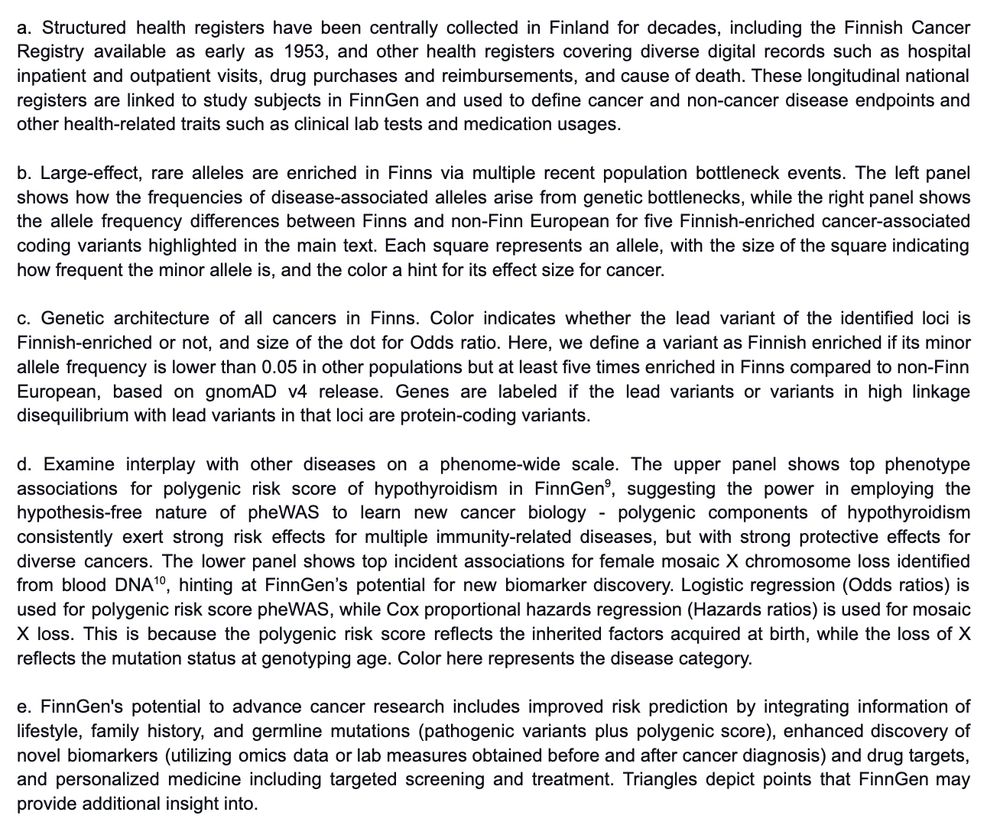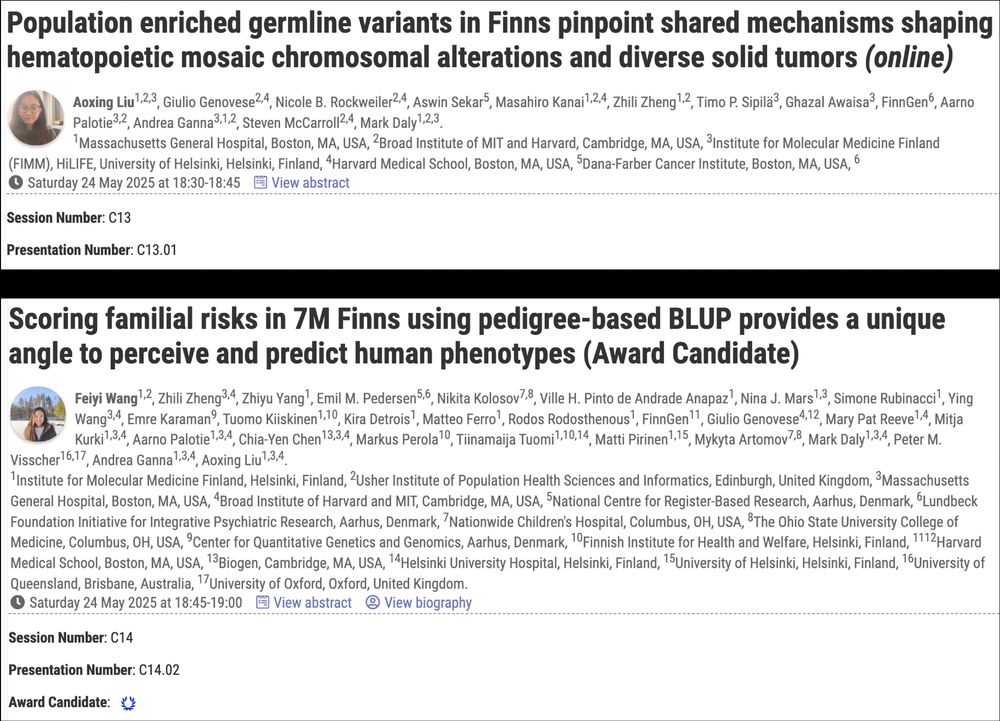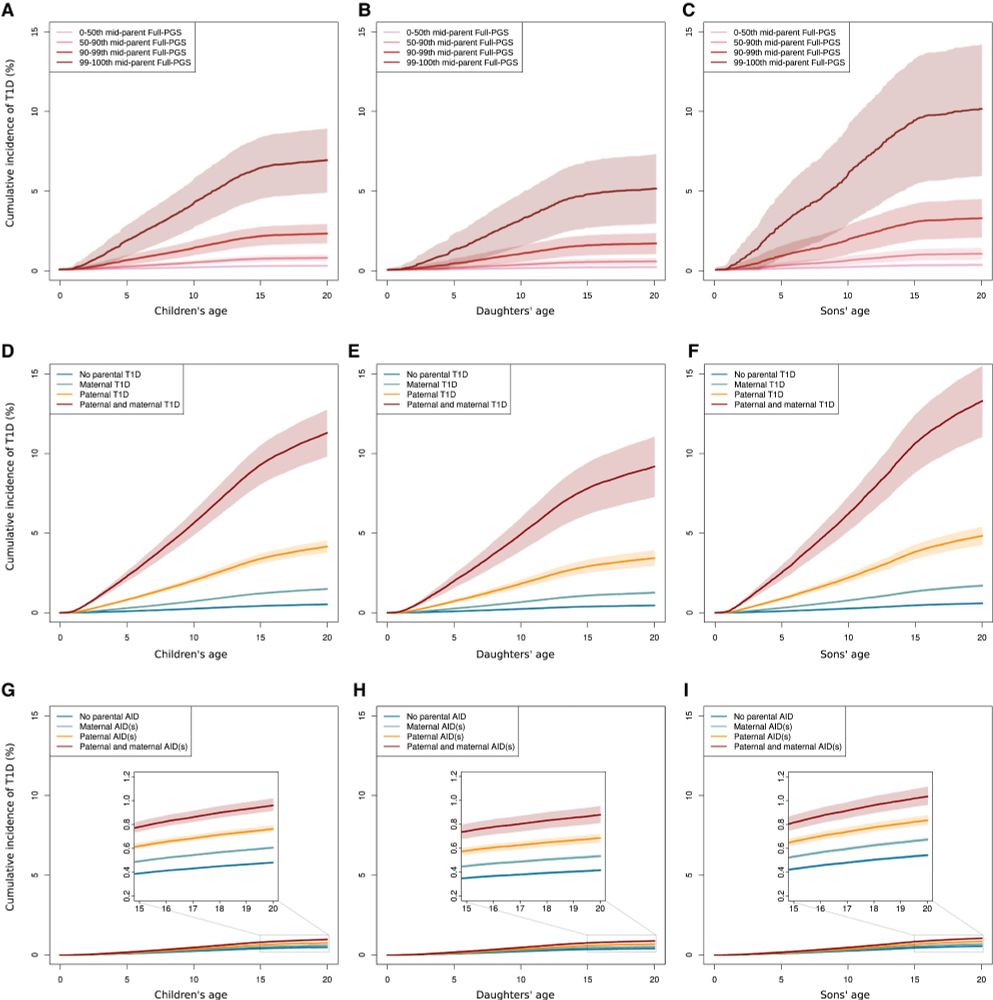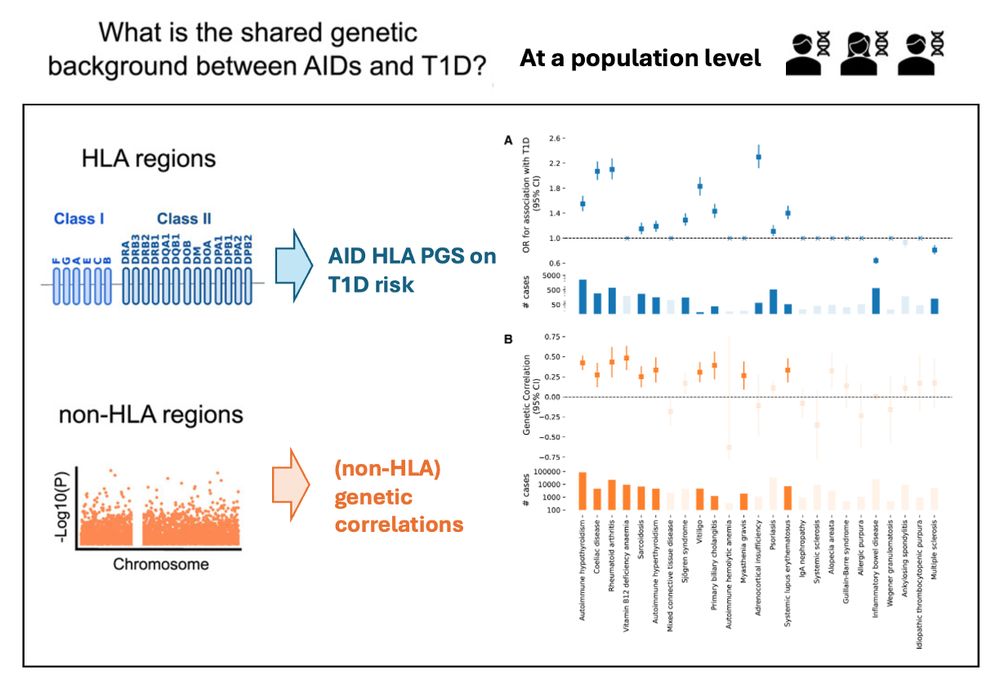
We did so in our pedigree-BLUP work:
we estimated family-based h2 & compared it to SNP h2 to clarify the different concepts of heritability!!

We did so in our pedigree-BLUP work:
we estimated family-based h2 & compared it to SNP h2 to clarify the different concepts of heritability!!
(View-only full text -> rdcu.be/eLlJs)


(View-only full text -> rdcu.be/eLlJs)
"Decoding Human Aging: From Single-Cell Resolution to Population-Scale Insights"
⏰ Oct 17, 8:30-10:00 AM
🏡 258ABC, Level 2
With a fantastic ✨ speaker lineup - @albarmeira.bsky.social & Albert (Kejun) & Giulio & @austinargen.bsky.social!
2/n

"Decoding Human Aging: From Single-Cell Resolution to Population-Scale Insights"
⏰ Oct 17, 8:30-10:00 AM
🏡 258ABC, Level 2
With a fantastic ✨ speaker lineup - @albarmeira.bsky.social & Albert (Kejun) & Giulio & @austinargen.bsky.social!
2/n
⏰ Oct 15, 1:30 -1:45 PM
🏡 258ABC, Level 2
I'll be giving a talk on sex chromosome trisomies (XXY, XYY, XXX) - and the surprising new biology of chromosomes X and Y!!
Link: meetings.ashg.org/event/ASHG25...
1/n

⏰ Oct 15, 1:30 -1:45 PM
🏡 258ABC, Level 2
I'll be giving a talk on sex chromosome trisomies (XXY, XYY, XXX) - and the surprising new biology of chromosomes X and Y!!
Link: meetings.ashg.org/event/ASHG25...
1/n
Got curious after reading our short PheWAS paper? 👀
Catch me 🌠 & my talk 🎤 this October at #ASHG25 in Boston!
Yes, I am still endlessly curious about sex chromosome aneuploidies - whether it's somatic (X/Y loss) or germline (trisomies)!! 💘

Got curious after reading our short PheWAS paper? 👀
Catch me 🌠 & my talk 🎤 this October at #ASHG25 in Boston!
Yes, I am still endlessly curious about sex chromosome aneuploidies - whether it's somatic (X/Y loss) or germline (trisomies)!! 💘
Preview: www.cell.com/cell-genomic...
Original research article: www.cell.com/cell-genomic...

Preview: www.cell.com/cell-genomic...
Original research article: www.cell.com/cell-genomic...
Because of ... I cannot join in person, but I will answer your questions online (or write to me)! 🧬
Feiyi & Zhiyu are in Milan now; discuss the BLUP work with them (if you can catch them❤️🔥)!
Enjoy the conference!

Because of ... I cannot join in person, but I will answer your questions online (or write to me)! 🧬
Feiyi & Zhiyu are in Milan now; discuss the BLUP work with them (if you can catch them❤️🔥)!
Enjoy the conference!
Parental T1D PGS is a strong predictor of T1D risk in children.
About parental PGSs of other AIDs - not adding too much to the prediction, given the high accuracy of T1D PGS.
PGS vs family history? High parental PGSs are usually more informative than a diagnosis of T1D in the mother or father.

Parental T1D PGS is a strong predictor of T1D risk in children.
About parental PGSs of other AIDs - not adding too much to the prediction, given the high accuracy of T1D PGS.
PGS vs family history? High parental PGSs are usually more informative than a diagnosis of T1D in the mother or father.
People with AIDs are less likely to have children - for many reasons, including fear of transmitting diseases to offspring.
By estimating T1D risk for their children, couples can have informed family planning.
Also, children at high risk can benefit from targeted screening & early prevention.

People with AIDs are less likely to have children - for many reasons, including fear of transmitting diseases to offspring.
By estimating T1D risk for their children, couples can have informed family planning.
Also, children at high risk can benefit from targeted screening & early prevention.
With pTDT, we see 2 main patterns for parent AID -> offspring T1D inheritance:
Pattern 1 – Overtransmission of both HLA & non-HLA PGSs for parental T1D, HYPO, RA, SLE.
Pattern 2 – Transmission occurs only for HLA: overtransmission for parental CD & psoriasis, undertransmission for IBD & MS.

With pTDT, we see 2 main patterns for parent AID -> offspring T1D inheritance:
Pattern 1 – Overtransmission of both HLA & non-HLA PGSs for parental T1D, HYPO, RA, SLE.
Pattern 2 – Transmission occurs only for HLA: overtransmission for parental CD & psoriasis, undertransmission for IBD & MS.
But our original curiosity is about parents & children...
We can run polygenic transmission disequilibrium tests (pTDT) with AID HLA & non-HLA PGS in FinnGen trios!
A reminder - pTDT checks if AID risk variants are passed on more or less to children with T1D compared to what would be expected.

But our original curiosity is about parents & children...
We can run polygenic transmission disequilibrium tests (pTDT) with AID HLA & non-HLA PGS in FinnGen trios!
A reminder - pTDT checks if AID risk variants are passed on more or less to children with T1D compared to what would be expected.
Now, let's revisit the question of the shared genetic background! 🧬🧬🧬
Overall, genetic analyses are consistent with epidemiological findings. For example, for HYPO, CD, RA, both HLA & non-HLA show positive effects.
However, for MS & IBD, non-HLA has no effect, while HLA has protective effects.

Now, let's revisit the question of the shared genetic background! 🧬🧬🧬
Overall, genetic analyses are consistent with epidemiological findings. For example, for HYPO, CD, RA, both HLA & non-HLA show positive effects.
However, for MS & IBD, non-HLA has no effect, while HLA has protective effects.
Genetic correlation is straightforward but remember HLA - largely impacting T1D & other AIDs - is excluded by LDSC.
If genetic correlation is a genome-wide non-HLA measurement, how can we get HLA back into the game?
We built a within-sample HLA PGS with weighted ridge classifiers in FinnGen.

Genetic correlation is straightforward but remember HLA - largely impacting T1D & other AIDs - is excluded by LDSC.
If genetic correlation is a genome-wide non-HLA measurement, how can we get HLA back into the game?
We built a within-sample HLA PGS with weighted ridge classifiers in FinnGen.
To what extent do the identified epidemiological associations result from genetics?🧬🧬🧬
Let’s download some summary stats and estimate some genetic correlations (quickly).
It looks not too bad - if we put the plot of epidemiological analysis aside for comparisons.

To what extent do the identified epidemiological associations result from genetics?🧬🧬🧬
Let’s download some summary stats and estimate some genetic correlations (quickly).
It looks not too bad - if we put the plot of epidemiological analysis aside for comparisons.
Which parental autoimmune diseases (AIDs) are associated with T1D in offspring?
With 14,571 trios having T1D-affected children and 43,713 matched control trios (1:3) in Finnish nationwide registers FinRegistry, we identified 9 AIDs associated with increased risk of T1D in offspring.

Which parental autoimmune diseases (AIDs) are associated with T1D in offspring?
With 14,571 trios having T1D-affected children and 43,713 matched control trios (1:3) in Finnish nationwide registers FinRegistry, we identified 9 AIDs associated with increased risk of T1D in offspring.
I will present our work on #mCAs & #solid_tumors in @finngen.bsky.social.
Register link: learning.ashg.org/products/202...
Excited to connect with you virtually months before the Boston annual meeting!! 🫶

I will present our work on #mCAs & #solid_tumors in @finngen.bsky.social.
Register link: learning.ashg.org/products/202...
Excited to connect with you virtually months before the Boston annual meeting!! 🫶

